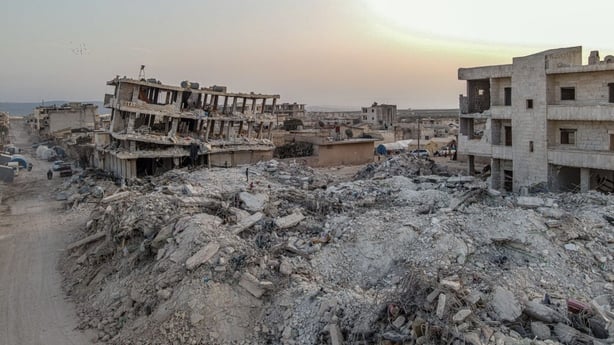The United Nations, the Syrian government and other actors are responsible for delays in getting emergency aid to Syrians after last month's earthquake, a UN-appointed commission of inquiry has found.
It described the failures as "shocking" and calling for a separate investigation.
The allegations add to a growing chorus of criticism of the global body for its role in the immediate aftermath of the quake that killed some 6,000 people in Syria, mostly in the rebel-held northwest near the Turkish border.
"Though there were many acts of heroism amid the suffering, we also witnessed a wholesale failure by the Government and the international community, including the United Nations, to rapidly direct life-saving support to Syrians in the most dire need," said Paulo Pinheiro, chair of the commission.
"The Syrian population has a right to the truth - why they received this treatment," he added.
Of the delays in UN aid, another member of the three-person commission, Hanny Megally, said: "You don't wait for permission to act in an emergency and that was what was shocking for us."
Even when aid did begin flowing, days after the 6 February quake, he said it was a backlog of food and other supplies and not the bulldozers and cranes needed to lift the debris or the medical equipment that could have treated the crush injuries of the rescued.
Syria's information ministry did not immediately respond to a request for comment.

A UN humanitarian office spokesperson said 720 trucks loaded with aid has so far arrived in northwest Syria using three border crossings.
He confirmed that no heavy equipment was sent in, saying this was the type of aid that only national authorities can provide.
Syria's government says humanitarian aid should go via territory under its control, although supplies to the northwest are allowed across the border from neighbouring Turkey under a UN Security Council agreement.
Last month's earthquake added to misery for people suffering from the consequences of 12 years of civil war, with more than four million people reliant on aid before it struck.
The independent commission was established to investigate violations by all parties to the conflict.
Commission member Lynn Welchman said the body planned to follow-up on an Israeli air strike that knocked Aleppo airport of service, forcing aid flights to be rerouted.
Turkey's quake toll tops 48,000 as govt attempts to build container cities
In Turkey, the death toll from last month's earthquakes has risen to 48,448, Interior Minister Suleyman Soylu said, as authorities rush to set up container cities to house for the longer-term those left homeless by the disaster.
The combined death toll including those killed in Syria has climbed to more than 54,000.
Speaking at a news conference in Malatya, one of the provinces hit by the quakes, Mr Soylu said the toll in Turkey included 6,660 foreign nationals, mostly Syrians, adding that authorities were still trying to identify 1,615 victims.
The earthquake and subsequent powerful tremors injured more than 115,000 in Turkey and left millions sheltering in tents or seeking to move to other cities.
President Tayyip Erdogan has pledged to rebuild homes within a year but it will be many months before thousands can leave their tents or container housing, and daily queues for food, and move into permanent housing.
Mr Soylu said the government plans to set up 115,585 containers for as many families in 239 sites across the affected region. He said 23 sites had been established so far and 21,000 containers were set up, with 85,000 people living in them.
He said 433,536 tents had been set up since the earthquake in 354 sites, adding that businesses would be given new temporary workplaces in the next 10 days.
During a visit yesterday to Hatay, one of the worst-hit regions, President Erdogan said Qatar had pledged to send 10,000 containers, which were used during the soccer World Cup at the end of last year.
Mr Soylu said of the 36,257 buildings that collapsed, the rubble of 5,321 had been cleared, while 6,000 of 18,219 buildings slated for immediate demolition had been knocked down and the resulting rubble cleared.
He said the collapsed buildings and those slated for immediate demolition made up only 25% of the work, while other heavily damaged buildings that need to be demolished and cleared make up 75%.

